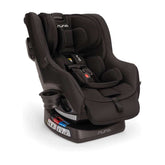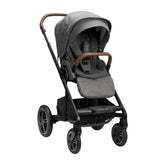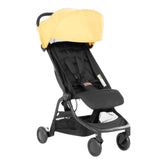Hand, Foot, and Mouth Disease: What Parents Need to Know

Updated 26 Dec 2024
Hand, foot, and mouth disease (HFMD) is an extremely common viral infection that typically affects children. While it’s not serious (most kids get better without medical treatment), it can be extremely uncomfortable and can lead to complications in some cases. Let’s take a closer look at what you need to know about HFMD, its symptoms, treatment, and prevention.
What Triggers Hand, Foot, and Mouth Disease: Causes It and How It Spreads
HFMD is a viral infection that is caused by the Enterovirus family, most commonly the Coxsackievirus. It is extremely contagious and can spread through contact with an infected person's saliva, mucus, or stool. It is most common in children under the age of 5 but can affect anyone, including adults. This highly transmissible virus spreads from person-to-person in any number of ways. For example:
- Exposure to respiratory droplets containing virus particles after an infected individual coughs or sneezes
- Close contact with a sick person, like kissing, hugging, or sharing utensils
- Contact with a sick person’s feces, i.e., changing a diaper, then touching your face
- Contact with contaminated surfaces, such as a toy or handle, then touching your face
It’s also possible (though rare) to get the virus from improperly treated swimming pools contaminated with fecal matter.
How Long Is Hand, Food, and Mouth Contagious?
Infected individuals are most contagious during the early stages of hand, foot, and mouth disease, typically the first week to ten days that they’re ill. However, it’s possible to spread the virus to others for days or weeks after symptoms disappear. Asymptomatic transmission is also possible. While children younger than age 5 are the most common carriers, older kids and adults can become infected as well. In fact, it’s possible to have hand, foot, and mouth disease multiple times.
Symptoms of Hand, Foot, and Mouth Disease: Early Signs
Symptoms of hand, foot, and mouth disease typically appear within three to five days after exposure and include fever, mouth sores, and a blister-like skin rash.
- Fever and flu-like symptoms. Many kids experience fever along with other flu-like symptoms following exposure. They may not feel thirsty or seem to have much of an appetite and often have a sore throat.
- Mouth sores. The mouth sores can be very painful and make it difficult to eat, drink, or swallow. They typically begin as little red bumps inside the mouth and on the tongue. You may notice your child avoiding food and drink or preferring only cold drinks. Infants with HFMD may drool more than they normally do.
- Skin rash. Hand, mouth, and foot disease causes a rash on the hands, feet, and sometimes buttocks. The rash on the hands and feet can be uncomfortable, though it’s usually not itchy. Fluid-filled blisters may form and scab over as they heal. Try to keep these blisters clean and avoid contact with them.

Image courtesy of the Cleveland Clinic
What Is the Best Treatment for Hand, Foot, and Mouth Disease?
There is no exact treatment for HFMD, and most symptoms resolve on their own within a week to ten days. Over-the-counter pain relievers can help with fever and pain. For kids old enough to gargle, “Magic mouthwash,” a prescription combination of an antacid (Maalox®), a liquid antihistamine (Benadryl®), and a painkiller such as lidocaine, is often extremely effective at alleviating the discomfort from mouth sores. Above all, be sure to keep the sick person hydrated. Mouth sores can make it uncomfortable to swallow, so a sick kid may not want to drink much.
Most hand, foot, and mouth disease symptoms resolve on their own within a week to ten days. Consult your child’s pediatrician if they have a compromised immune system or are younger than six months old. You should also contact the doctor if symptoms don’t improve after ten days, symptoms seem severe, or you suspect dehydration. In severe cases, hospitalization may be necessary for hydration and pain management.
Hand, Foot, and Mouth Disease Prevention
The best way to prevent HFMD is to practice good hygiene. Wash your hands frequently with soap and water for at least 20 seconds after using the bathroom, changing a diaper, blowing your nose or coughing, or caring for an infected individual. If soap and water aren’t available, use an alcohol-based hand sanitizer. Avoid close contact with people who have the virus, and don't share utensils or cups with them. Clean and disinfect surfaces frequently, especially if someone in the household is sick.
Can My Child Go to School With Hand, Foot, and Mouth Disease?
Because HFMD is usually rather benign, kids can continue attending school or daycare as long as they are fever-free, have no uncontrolled drooling with mouth sores, and feel well enough to partake in classroom activities. Consult with your pediatrician if you’re feeling unsure about whether it’s okay for them to go back to class. In some instances, your school, daycare, or local health department may instruct kids with hand, foot, and mouth disease to stay home in order to manage an outbreak.
The Takeaway on Hand, Foot, and Mouth Disease
Hand, foot, and mouth disease is a common viral infection that is mostly seen in young children. It can cause a range of symptoms that can be very uncomfortable and lead to complications in some cases. Practicing good hygiene can help prevent the spread of the virus, and most people recover on their own within a week to ten days. If you or someone you know has hand, foot, and mouth disease, contact a healthcare provider for guidance on managing symptoms and preventing the spread of the virus.
Disclaimer: The information on our site is NOT medical advice for any specific person or condition. It is only meant as general information. If you have any medical questions or concerns about your child or yourself, please contact your health provider.









